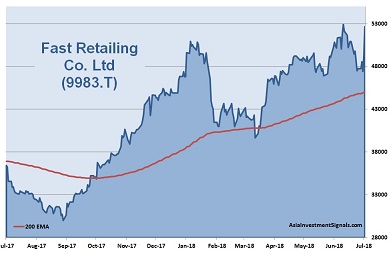 Fast Retailing Co. Ltd (9983.T) is the company behind the labels UNIQLO, GU, Theory, Comptoir des Cotonniers, Princesse tam.tam and J Brand. The company, which runs more than 3,400 stores worldwide, ranks second in market capitalization and third in sales among major global apparel manufacturer and retailers such as Inditex/Zara and H&M.[mepr-active membership=”1734″ ifallowed=”show” unauth=”message” unauth_message=”Please login or purchase a membership to view full text.”] Fast Retailing’s ambition is to become the world’s largest fashion company by 2020. The concept behind its success: simple, sporty design, affordable prices, and few basic models in numerous variations. Fast Retailing’s produce its clothing in over 100 factories in China.
Fast Retailing Co. Ltd (9983.T) is the company behind the labels UNIQLO, GU, Theory, Comptoir des Cotonniers, Princesse tam.tam and J Brand. The company, which runs more than 3,400 stores worldwide, ranks second in market capitalization and third in sales among major global apparel manufacturer and retailers such as Inditex/Zara and H&M.[mepr-active membership=”1734″ ifallowed=”show” unauth=”message” unauth_message=”Please login or purchase a membership to view full text.”] Fast Retailing’s ambition is to become the world’s largest fashion company by 2020. The concept behind its success: simple, sporty design, affordable prices, and few basic models in numerous variations. Fast Retailing’s produce its clothing in over 100 factories in China.
UNIQLO International, the brand outside of Japan, contributed to 42 percent to the company’s revenues, to 47 percent to the profits, and grew by 28 percent over the first nine months of its fiscal year 2017/18. UNIQLO Japan, the domestic operation, contributed to 41 percent to the revenues, 51 percent to the profits, but grew by only 8 percent during that period. GU and the other brands increased between 6 and 10 percent during that period.
Particularly China, South Korea, and Southeast Asia are targets for the future growth and expansion strategy. To a lesser extent also Europe including Russia and America. A ten-year sponsorship agreement with Swiss Tennis Star Roger Federer will boost Uniqlo’s international expansion efforts.
To stay ahead of its competitors, Fast Retailing launched the ‘Ariake Project’ to proactively transform itself into a digital consumer retail company and to quickly translate customer desires into better products and services. The latest announcement to strengthen co-operation with garment machinery supplier Shima Seiki to produce customized products at mass scale and lower costs is a further step towards the digitalization of its fashion value chain.
Fast Retailing was founded in 1949 and is headquartered in Yamaguchi, Japan. The shares are listed on Tokyo’s stock exchange since 1999. The company’s shares can also be traded in Hong Kong, Germany, the US, and in Mexico. The founder and president of the company, Tadashi Yanai, together with his sons is major shareholder with ownership of around 30 percent. 50 percent of the shares are in the public hand.
With a workforce of over 44,000 employees, Fast Retailing reported revenues of 1,704bn JPY (15bn USD) and profits before tax of 238bn JPY (2.1bn USD) during the first nine months of its fiscal year 2017/2018. This is an increase of 15 and 22 percent respectively compared to the same period a year ago. Fast Retailing reached during this nine-month period already more than 90 percent of its full last year’s results. In its fiscal year 2016/2017, revenues and profits were up 4 and 114 percent respectively. The operating margin of 11 percent is slightly above industry average. Fast Retailing’s cash reserves increased by 51 percent during the nine-month period to 858bn JPY (7.6bn USD) at the end of May 2018. The company shows a solid balance sheet with good profitability and financial strength and no bank borrowings. The equity ratio is at 47 percent and the gearing, defined here as total liabilities to total equity, at 53 percent. Standard & Poor’s current rating of Fast Retailing is A with a positive outlook. Next full-year results will be announced mid-October.
Fast Retailing’s shares are in an uptrend since September last year and gained more than 76 percent in value since, 17 percent alone this year. The company is priced at 37 times earnings, five times book value and at 26 times cash flow. The latest dividend yielded roughly one percent. 12 out of 17 analysts had ‘buy’ or ‘outperform’ recommendations on the stock.
Our Conclusion: The company shows a healthy balance sheet with excellent profitability and financial strength. The valuation is high and will put much pressure on future growth expectation. Revenues and profits grew by 15 and 11 percent respectively over the last five years. The industry outlook is positive. The McKinsey Global Fashion Index forecasts industry sales to grow between 3.5 to 4.5 percent in 2018. The company is well positioned in an intensely competitive environment. Assuming a stable global economy, we expect the share price to increase between 5 to 10 percent until the end of this year.
AIS Rating: ★★★☆☆
| 2012/13 | 2013/14 | 2014/15 | 2015/16 | 2016/17 | 2017/18 Q1-3 only |
|
|---|---|---|---|---|---|---|
| EPS (JPY) | 1,026 | 731 | 1,078 | 471 | 1,168 | 1,452 |
| Change | 46% | -29% | 48% | -56% | 148% | 23% |
| P/E | P/E SECTOR |
P/B | P/CF | Equity Ratio* |
ROE | LIAB./ Equity** |
Div YLD |
|---|---|---|---|---|---|---|---|
| 37 | 19 | 4.9 | 26 | 47% | 14% | 53% | 1% |
* Equity / Total Assets, ** Total Liabilities / Equity
[/mepr-active]
